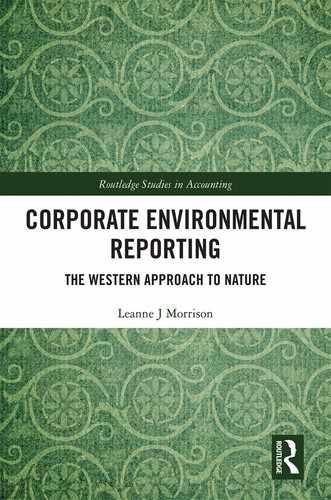This book explores corporate environmental discourse by examining a sample of corporate environmental reports through the lens of environmental philosophy. Findings include the predominant use of a dualistic approach towards nature, which highlights the perceived ‘separateness’ of companies from the natural world. Also explored are the corporate articulations of interconnectivity and transcendence, two philosophical approaches that are also in common use in western culture. The expression of these themes reveals the discursive underpinnings of a harmful relationship with nature. Exploring the ways in which discourse informs corporate relationships with nature allows for an in-depth ‘diagnosis’ of current environmental problems. The history of environmental philosophy demonstrates how some powerful philosophical approaches have shaped the western relationship with nature over time, and continue to do so through corporate environmental reporting. Corporate Environmental Reporting: The Western Approach to Nature demonstrates how corporate reporting is used to reduce the perception of the corporate responsibility, and contributes to the erosion of broader cultural restraints against the harmful treatment of nature. As such, discourse is integral to the survival of the world which we – and other members of our biotic community – are utterly reliant on. It shows the latest state of knowledge on the topic and will be of interest both to students at an advanced level, academics and reflective practitioners. It will be of interest to researchers, academics, and students in the fields of accounting, management, environmental philosophy and sustainable management.
Table of Contents
- Cover
- Half Title
- Series Page
- Title Page
- Copyright Page
- Table of Contents
- List of Figures
- List of Tables
- Preface
- Acknowledgements
- 1 Western Environmental Discourse and the Corporate Report
- 2 Western Environmental Philosophy
- The Impacts of Western Environmental Philosophy
- The Role of Social Construction
- Western Culture
- A History
- Western Environmental Philosophies
- Intrinsic and Instrumental Values
- Ecofeminism
- Deep Ecology
- Aristotelian Ethics
- Fundamental Issues in Western Environmental Philosophy
- Immanence
- Interconnectivity
- Dualism
- Enlightenment Thought
- Modernism
- Transcendence
- Summary
- 3 Corporate Reporting
- Introduction
- Social Construction through Accounting
- Accounting as Discourse
- Accounting and Sustainability Reporting
- Sustainability and Environmental Reporting
- Corporate Environmental Reporting
- Environmental Reporting as Stakeholder Engagement
- Accountability and Transparency
- A Critical Approach
- Link to Western Environmental Philosophies
- Summary
- 4 Operationalising Critique
- Introduction
- Methodology
- A Qualitative Approach
- A Historical Perspective
- A Critical Approach
- Critical Discourse Analysis
- The Discourse
- Environmental Reports
- Written Word
- Images
- Other Discursive Mechanisms
- Interviews
- Analysing the Discourse
- Metaphor
- Ideology
- Hegemony
- Discourse Groupings
- Dualism
- Ontology of Discrete Objects
- Dualistic Anthropocentrism
- Dualistic Hierarchy
- The Human Nature Divide
- Transcendence
- Physical World Less Valued than the Transcendent
- Seeing Physical World from Afar
- Transcendent Anthropocentrism
- Interconnectivity
- Connections between Subjects
- Humans as Part of Nature
- Nature Intrinsically Valued
- Application of Discourse Groupings
- Summary
- 5 Predominant Corporate Philosophical Approaches
- Introduction
- Multiple Case Studies
- The Environmental Reports
- Interviews
- Zeta
- Zeta Environmental Reports
- Zeta Interview
- Gamma
- Gamma Environmental Reports
- Gamma Interview
- Beta
- Beta Environmental Reports
- Beta Interview
- Phi
- Phi Environmental Reports
- Phi Interview
- Delta
- Delta Environmental Reports
- Delta Interview
- Alpha
- Alpha Environmental Reports
- Alpha Interview
- Kappa
- Kappa Environmental Reports
- Kappa Interview
- Psi
- Psi Environmental Reports
- Psi Interview
- Theta
- Theta Environmental Reports
- Theta Interview
- Sigma
- Sigma Environmental Reports
- Sigma Interview
- Comparison
- 6 Prevalent Discursive Mechanisms
- Introduction
- Discursive Motifs
- Prevalent Discursive Mechanisms
- Dualism
- Use of Charts, Graphs and Tables
- Focus on Numbers
- Financial Language
- Materiality
- Nature as a Resource
- Offsets
- Images Minimising Apparent Impact
- Carbon Accounting
- Carbon Neutrality
- Environmental Risk
- Awards, Self-Congratulatory
- Images Which Conflict with the Surrounding Text
- Direction of Readers’ Attention Away from the Report
- Regulatory Focus
- Positive Contribution to the Environment
- Transcendence
- Interconnectivity
- Case Studies
- Summary
- 7 Unravelling the Discourse
- Introduction
- Major Findings
- Analytical Themes
- Dualism
- Dualism in Context
- Transcendence
- Transcendence in Context
- Interconnectivity
- Interconnectivity in Context
- Meaning and Importance of Findings
- Meaning of Other Findings
- Practical Implications
- How These Findings Relate to Prior Literature
- Social Constructionism
- Western Environmental Philosophy
- Corporate Environmental Reporting
- Link to Theory
- Alternative Explanations
- Relevance of Findings
- Summary
- 8 Reflecting on the Discourse of the Corporate Report
- Index
